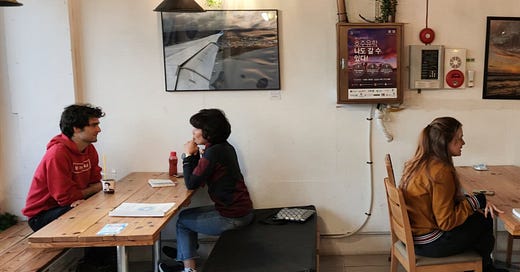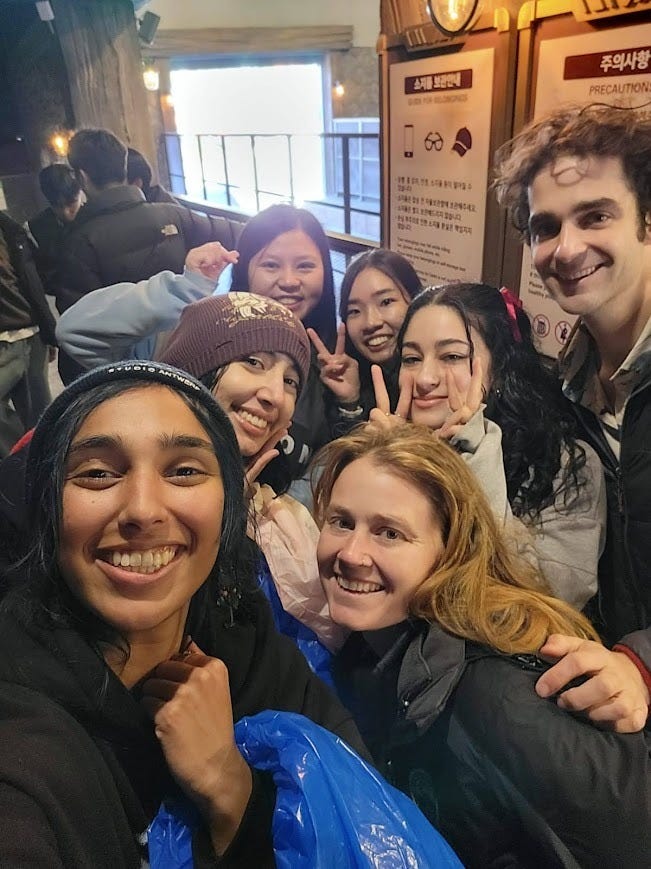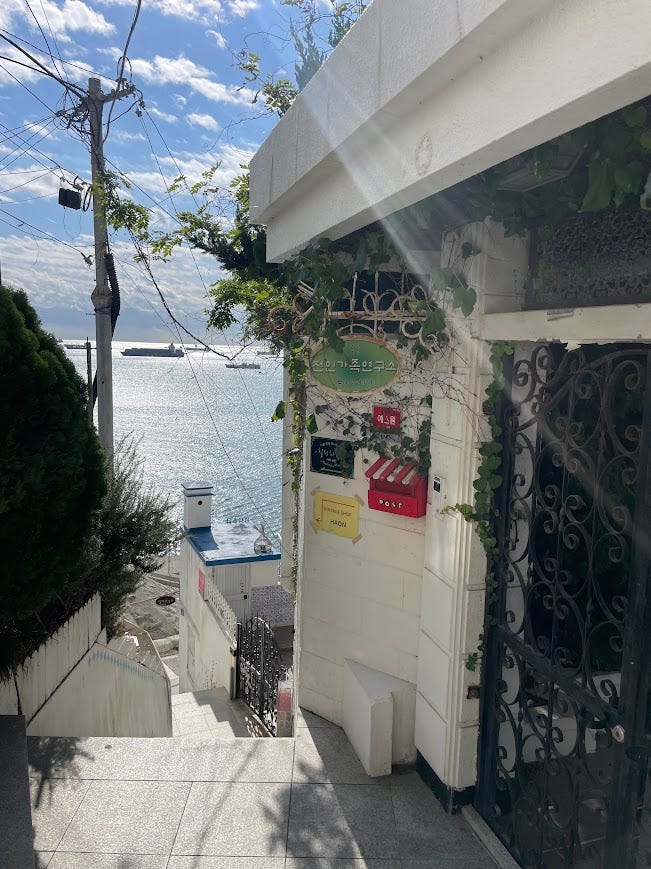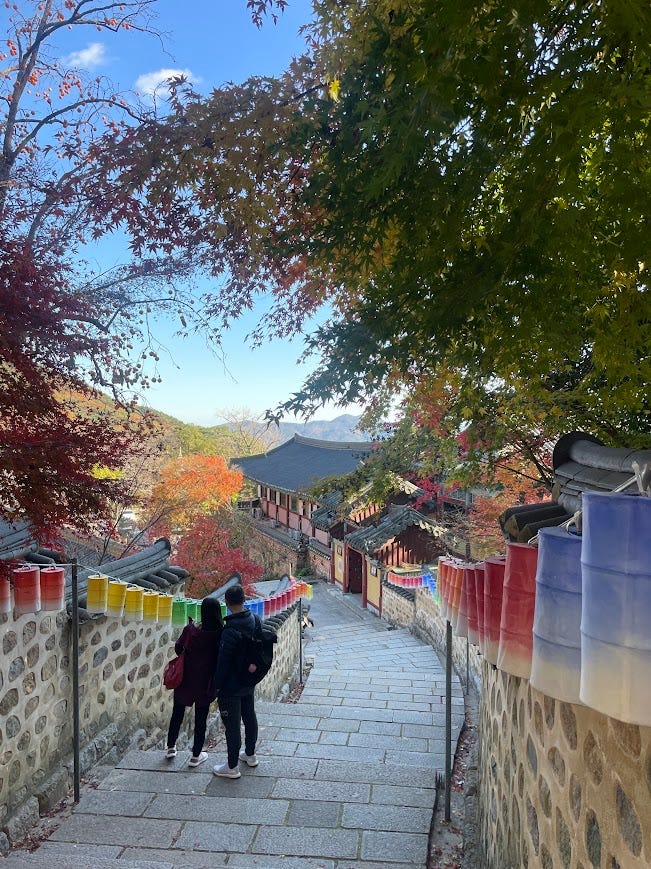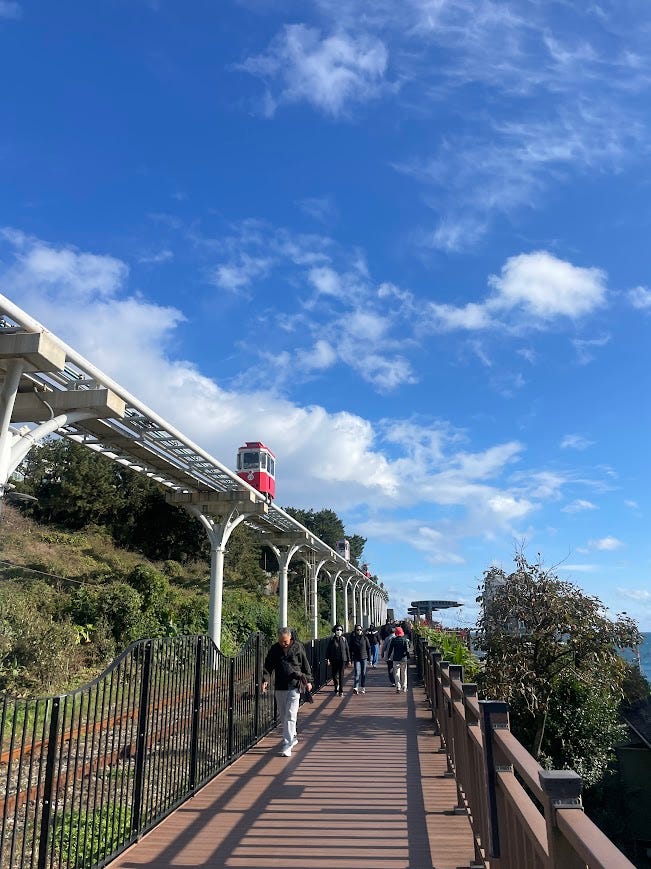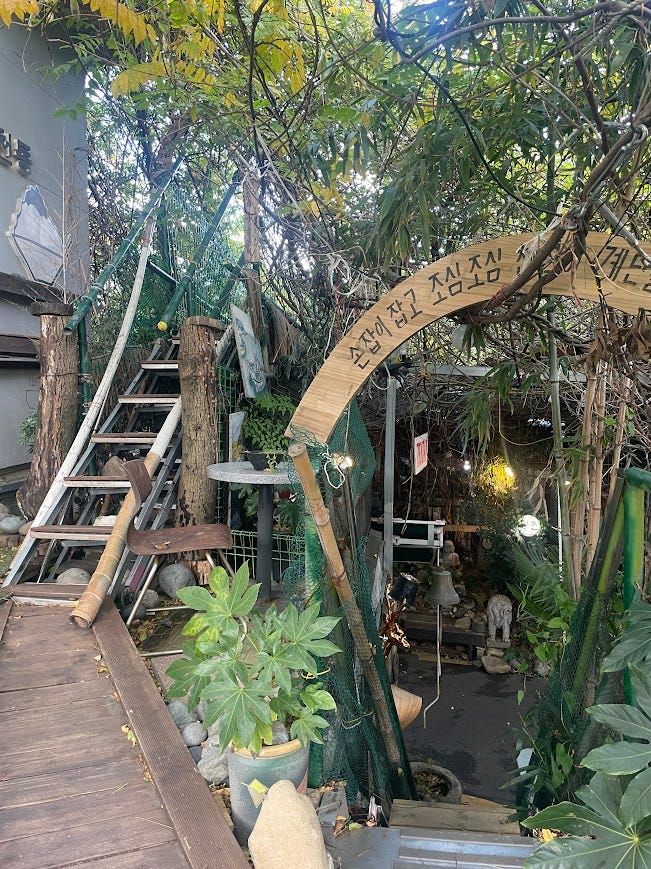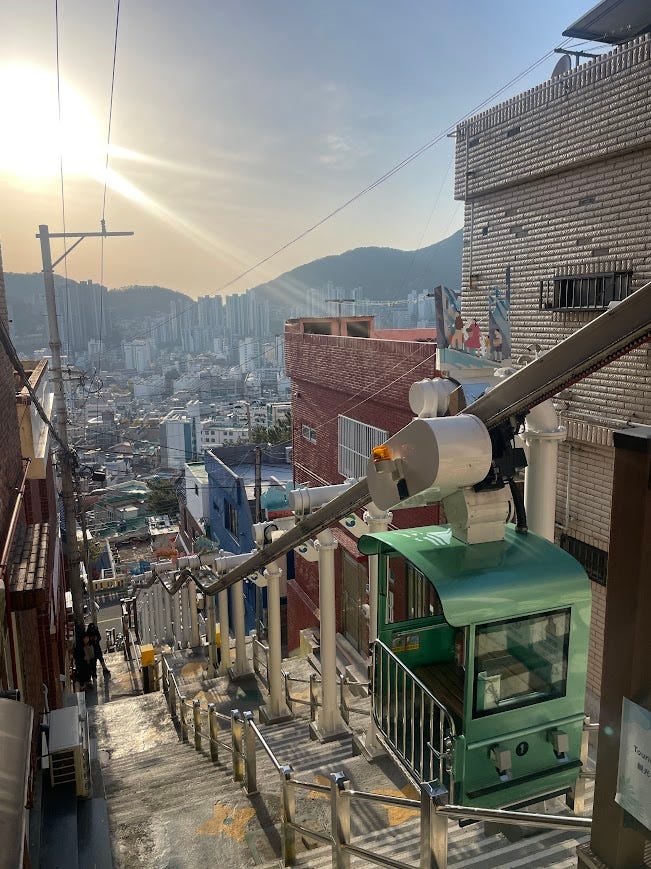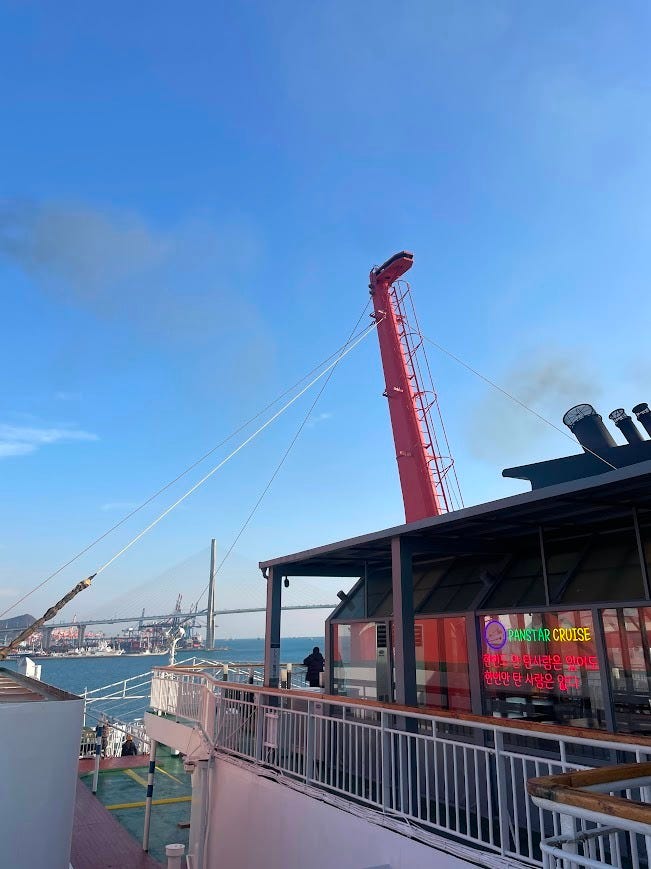Hi from rural Japan!
It’s been a long time since I’ve written anything here, but that’s not because I haven’t been writing! Instead of drafting these meandering reflections, instead I have spent much of my free time writing cover letters! I have plenty more I could say about my approach and feelings towards finding full-time work again post-sabbatical, but that will have to wait for another newsletter. I’ve been trying to balance churning out job applications, learning multiple new languages, and enjoying this next big chapter of our travels. For the most part, I have felt a lot of purpose in staying busy and focused on big projects. But I’ve been eager to share about our month in South Korea, so let’s get to it!
A Hard-Won Peace
I normally structure each of these posts with a little description of where we’ve been and what we’ve been up to, followed by some broader reflections and what’s next. But I’m switching up the format this week as I reflect on our time in Busan.
When we first arrived in Busan, the volunteer apartment was pretty much at full capacity, though experiencing rapid turnover. While we’ve gotten used to living in small or shared quarters from our time in the campervan and backpacking huts, the accommodation was even smaller than expected (though perspective is everything — a volunteer coming in from a similar program in Seoul thought the Busan apartment was huge by comparison). We lived in dorms with 6 people/3 bunks in rooms that would have been considered on the smaller side for one person. There was essentially no privacy to speak of, even while lying in one’s own bunk. The apartment also had some spoken/unspoken interpersonal tensions between backpackers that we couldn’t really avoid given the close proximity. We could have easily decided early on that we couldn’t make the situation work and needed to pivot.
I write most of these posts retrospectively, when we’ve adapted positively to a new situation or have already had our warm memories and hugs goodbye. But this experience of initial discomfort is one we’ve experienced constantly during our travels. In our WWOOFing situations, there are always a few days of awkwardness up front, as we adjust socially and logistically to living in the homes of people we literally just met for the first time. Even in the relative relaxation of our housesitting gig, we experienced stress as we tried not to break literally everything in their bathroom that was about to be renovated. Some of you may also remember hearing about the poorly kept lodge where we lived in our beloved Akaroa! In each of these situations, one or both of us has the initial reaction to bolt. We actually followed through with it only once, and we think we made the right call!
The lessons we’ve learned from constantly putting ourselves in new environments have been two-fold. On one hand, we’ve learned we can move through initial discomfort in new situations and come out on the other side with great friends and overwhelmingly positive experiences we wouldn’t trade. On the other hand, we’ve also learned how to assess when to “call it” if a situation isn’t working for us. While the pace and practicality of these types of decisions is different in our normal lives than our weeks-long Recess gigs, it definitely feels like these lessons and skills will apply in other situations.
By the end of our time in Busan, we had really connected with our housemates, and were able to embrace the fun aspects of group living. I have all of these lofty ideals about building community, but our time in Busan reminded me that sometimes your community is just the people who are right in front of you. It’s the stuff every New Girl or Friends-style sitcom is made of. We experienced it in Akaroa, and it’s one of the reasons we sought out this style of volunteering in the first place. When you live right on top of each other, you inevitably end up talking about your days or someone’s shitty ex-boyfriend in France who won’t stop calling. We took our own space as we needed it, but by leaning in more to the apartment instead of less, we ended up having a lot of fun and even some tearful goodbyes.
But it didn’t take until the end of our time in Busan to feel this way. Within a few days of arriving, I felt a sense of overwhelming peace and happiness that I can honestly say I haven’t felt in a long time, maybe ever. As we sat at a cafe in Haeundae Beach discussing whether we needed to pivot, I realized how confident I felt in the realization that we could either make it work or make a change, and we would be happy either way. When we arrived in Korea, I had also just begun more dedicated efforts towards my job search. At the same time, we were discussing when and how to end our travels, as this stage of our trip has involved more regular decision points. I initially had some fear around going back to the U.S. without employment, as this lack of direction sounded like a rough transition out of the sabbatical year. But as we discussed our options, I realized this fear had mostly evaporated. At the risk of sounding dramatic, I felt like I saw both the next few months and my whole life ahead of me, and felt a deep confidence and peace that I would find a way to adapt and be happy in any situation. That even non-ideal situations still offer me things that I really want. That I know myself and, in that self-knowledge, I can give myself the kindness of adapting instead of just pushing through.
Almost a month later, the feeling still hasn’t gone away. Even as I am experiencing stress around applying for jobs, finding health insurance, and other realities of returning after a year away, the stress is only surface-level. I know I will experience more of it, and there will definitely be challenges in off-ramping from such a life-changing year. But existentially, I feel like everything is going to be okay. Whatever the situation, I know that I can find happiness. Maybe this sounds silly to people who just live with this as an inherent belief, but for me the mantra feels hard-won.
It’s easy to wonder if I only have these transcendent feelings because I’ve been traveling and haven’t had to “work” for the past year. That maybe I’ll just go back to feeling the same way as before when I’m back to the daily grind. But I think this is too reductive. While this year has afforded me the time and space to work through these issues in unique ways, I feel like the lessons I’ve learned are too embodied to disappear so quickly. One way of experiencing travel or time off, especially for an extended period, is that it was the best time of your life, and now you’re going back to the drudgery of your “normal life.” There are some ways to avoid this. You can be a perpetual backpacker, as is the current plan of some people we’ve met. You can use the time off as an opportunity to make a major pivot, so that it feels less like you’re going back to the same career or place. While these ideas sometimes sound appealing, I have to some extent always imagined that having the key to an apartment and a job contract will mark the official end of Recess, as quitting my job to live out of a backpack was the initial premise that started this whole thing. For now, I’ve made my peace with applying for to 9-5 office jobs, not because it’s what I see myself doing forever, but because it’s a path I see giving me certain things that I want right now, like geographic stability and a place to live with an oven and a cat. Returning to a traditional path is, of course, not the only way to achieve my goals! Chris and I talk a lot about what it looks like to keep the “recess mindset” in our daily lives, while also daydreaming about having dynamic careers and lives in alignment with the lessons of Recess in the long-term. I’m sure I’ll have a lot more to say about this as we begin the transition! I plan to keep writing during the re-adjustment period, as it feels like a key component of a year away. But for now, more on our time in Busan!
Language, Language, Language!
Our main reason for landing specifically in Busan was that we were volunteering at a language cafe! In exchange for accommodation, we volunteered 15 hours a week as conversation partners with Korean English-learners. It felt like pretty easy “work,” as it mostly involved getting to know people! We often had repeat conversation partners, which allowed our conversations to go a little deeper.
Spending time with motivated language-learners was really inspiring. I was really struck by how people’s reasons for learning a new language were often tied to their goals and dreams for their lives. Some people wanted to change careers, such as to be a tour guide or translator. A professor was excited to take a sabbatical in Texas, so we exchanged emails for me to give recommendations! An retired lady wanted to be able to translate for the English services at her church. Students wanted to study or work abroad. And some people were just in it for the love of learning new languages.
In the meantime, I’ve also been trying to pick up some new language skills! I spent about two months studying beginner Korean, which really added to our time there! Being able to read Hangul gave me confidence in figuring out directions and reading menu words adapted from other languages. Japanese has been going much more slowly, as it has three alphabets! I’ve been focusing more on useful words and phrases. I’ve also set a goal of becoming fluent in French next year, which feels achievable given that I know Spanish, English, and Latin. This is mostly motivated by applying for some international jobs that prefer French as a second language. But I was also just inspired by living with backpackers from so many different countries, where almost everyone was bilingual or trilingual. We enjoyed smirking at lighthearted gossip in Spanish among roommates from Colombia and America, or seeing fun personalities coming out even more strongly when roommates from France and Belgium switched into French. Learning new languages, while also studying international affairs for career competency exams, has made me feel like a student again in the best way.
Life in Busan
After spending much of the year out in the bush, we were eager to embrace city life. We left the house each day around 10am to catch a bus or train. We usually did a combination of sightseeing and working at a cafe or library. We spent a lot of time walking around different neighborhoods, visiting museums and temples, and enjoying Busan’s many coastal walks. In the afternoon, we headed to our volunteering gig! On our days off, we did bigger excursions like a hike in the mountains or a stay at a Buddhist temple in a historic town. Some of our favorite experiences were:
Visiting Yeongdo Island, specifically the Huinnyeoul Culture Village, which has been branded as the “Santorini of Busan” for its narrow, often colorful walkways by the coast.
Seeing the fall colors all over Busan, but especially at the Beomosa Temple. One of our retired conversation partners at the language cafe offered to drive us up on a Saturday morning, which made the memory even sweeter.
Walking at Blueline Park, which includes glass observation decks and views of the cutest little “sky capsule” trams.
Hanging out at the cutest patbingsu (shaved ice) cafe with the most incredible, multilevel rooftop garden. We even saw cats using it as a commuter path, as the roof crosses the street!
Sitting in the staircase of our apartment to listen to the live music coming up from the jazz bar underneath us!
Visiting SpaLand. We had loved our first jjimjilbang experience in Seoul, but going to an absurdly large facility with what felt like countless baths and saunas was unforgettable. Plus, it was only $10. I would genuinely go multiple times a week if this was available to me at home.
Doing karaoke with our housemates in a nurebang, which was our own karaoke room with all the bells and whistles (like strobe lights)! I haven’t stopped listening to BLACKPINK since. Or “APT.,” like much of the rest of the world.
Visiting “The Stairs of Wishes,” which is perhaps the cutest, actually useful public works project I’ve ever seen. It’s a small funicular serving elderly residents in a steep neighborhood!
Everyone has also asked us about the food in Korea! We enjoyed so much good street food, especially hotteok (a sweet pancake). I also managed to find some vegan versions of Korean fried chicken and bulgogi. Plus, we enjoyed multiple Buddhist temple meals, which are already completely vegan.
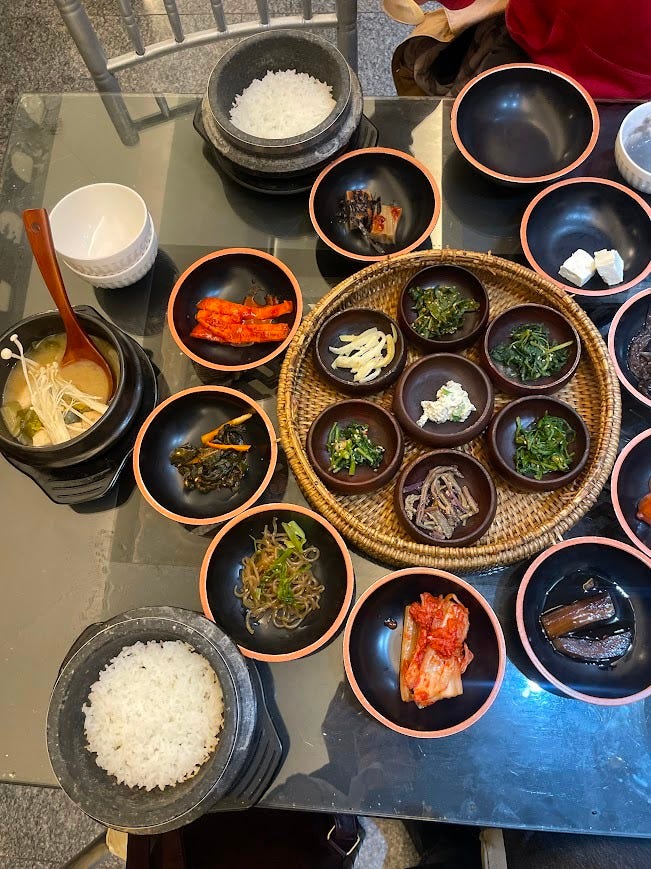
I also enjoyed adapting my cooking to the ingredients that were easily available and affordable to me. In particular, I cooked with varieties of mushrooms that I normally only buy on special occasions, like king oysters, beech, and enoki. We mostly ate Korean food at local restaurants and made Chinese food at home. We repeated a lot of meals, and I feel like I finally mastered a few old favorites. Continuing with the cooking theme from my recent Auckland post, here are some recipes I recommend!
Sesame-Crusted Tofu with Spicy Dipping Sauce from The Woks of Life
Chinese Eggplant with Garlic Sauce from The Woks of Life
Loads of recipes from The Vegan Chinese Kitchen (a cookbook written by a college friend that I can’t recommend enough!)
Stir-Fried Potato Threads
Napa Cabbage Vermicelli Salad (subbed with japchae noodles!)
Crispy Fried Mushrooms
Martial Law
There’s no natural way to transition from a paragraph about food to threats to democracy, but I would be remiss to end this post without talking about the attempted coup that happened while we were in Korea. At about 11 PM on a Tuesday night, President Yoon Suk Yeol declared martial law, the first time for the country in more than 40 years. While political tensions have been rising, the declaration seemed to come as a shock to nearly everyone. Protestors showed up to the capitol almost immediately, as members of Parliament attempted to assemble and overturn the declaration, with some having to jump over fences to get inside. I stayed up until three in the morning, until the motion passed and the military left the premises. That night, we weren’t sure what was going to happen. Martial law suspends standard civil liberties, and no one knew how far the President would go to undermine his opposition, whom he deemed as “anti-State forces” and accused of being sympathetic to North Korea.
The next day, things felt shockingly normal. People we talked to seemed relieved that the martial law had been overturned, and confident the President would be ousted. It’s not an adequate comparison, but the closest thing I have experienced is the day after January 6. Something so big had happened that profoundly threatened democracy, but you were still just supposed to continue on with your life the next day. I felt really emotional seeing all of the images of protestors, especially elderly ones, showing up in Seoul each day. Many people shared they came because history does not feel distant to them. Others, many of them young people, said they had never been to a protest but felt compelled to come to the capitol immediately, even from a few hours away.
In a piece published shortly after the election, Satya Doyle Byock wrote a list of reflections based on Timothy Snyder’s book On Tyranny. The first is that “most of the power of authoritarianism is freely given. In times like these, individuals think ahead about what a more repressive government will want, and then offer themselves without being asked. A citizen who adapts in this way is teaching power what it can do.” I felt really moved by the pro-democracy protests in South Korea, and how firmly they rejected this notion. Even after the immediate threat was addressed, people continued to protest to demand impeachment and arrest. Even when the first impeachment vote failed, people continued to put pressure until it passed. As South Korea continues to navigate what happens next, it’s easy to notice similar forces operating in other countries, including our own. As I prepare to return to our own brand of authoritarianism in the U.S., I’m thinking even more about the courage required to show up in the face of these threats.
What Else?
My last post focused heavily on getting off social media (namely, Instagram and Goodreads) after our time on the Great Walks. I deleted the apps shortly after we arrived in Korea, and the decision has played no small part in maintaining my improved outlook on my life. The excuses I had made to myself previously about the benefits now feel silly in comparison with all of the space in my brain I’ve regained. Shortly after, Anne Helen Petersen published this piece on posting less that echoes many of my thoughts! The algorithm (which perhaps none of us will ever fully escape) also led me to this great reflection on quitting social media and not missing it at all. It seems to be a hot topic right now among my friends, so I thought I’d share!
At the great recommendation of our friends Alex and Molly, we left arrived to Japan by overnight cruise! We landed in Osaka, where we spent about four days exploring Kyoto and Osaka. The wildest thing that happened is we literally ran into Chris’s childhood friend on the street in Kyoto! We enjoyed gyoza and dined at a vegan izakaya together before continuing our separate journeys. After a train stopover in Tokyo, we’re spending the next two weeks at a Workaway on a rice/vegetable farm in rural Japan. Then we’ll spend 11 days in Tokyo before flying home to the U.S.! As always, lots more to come when I get a chance to write it all down :) Excited to be reunited with so many people soon!

